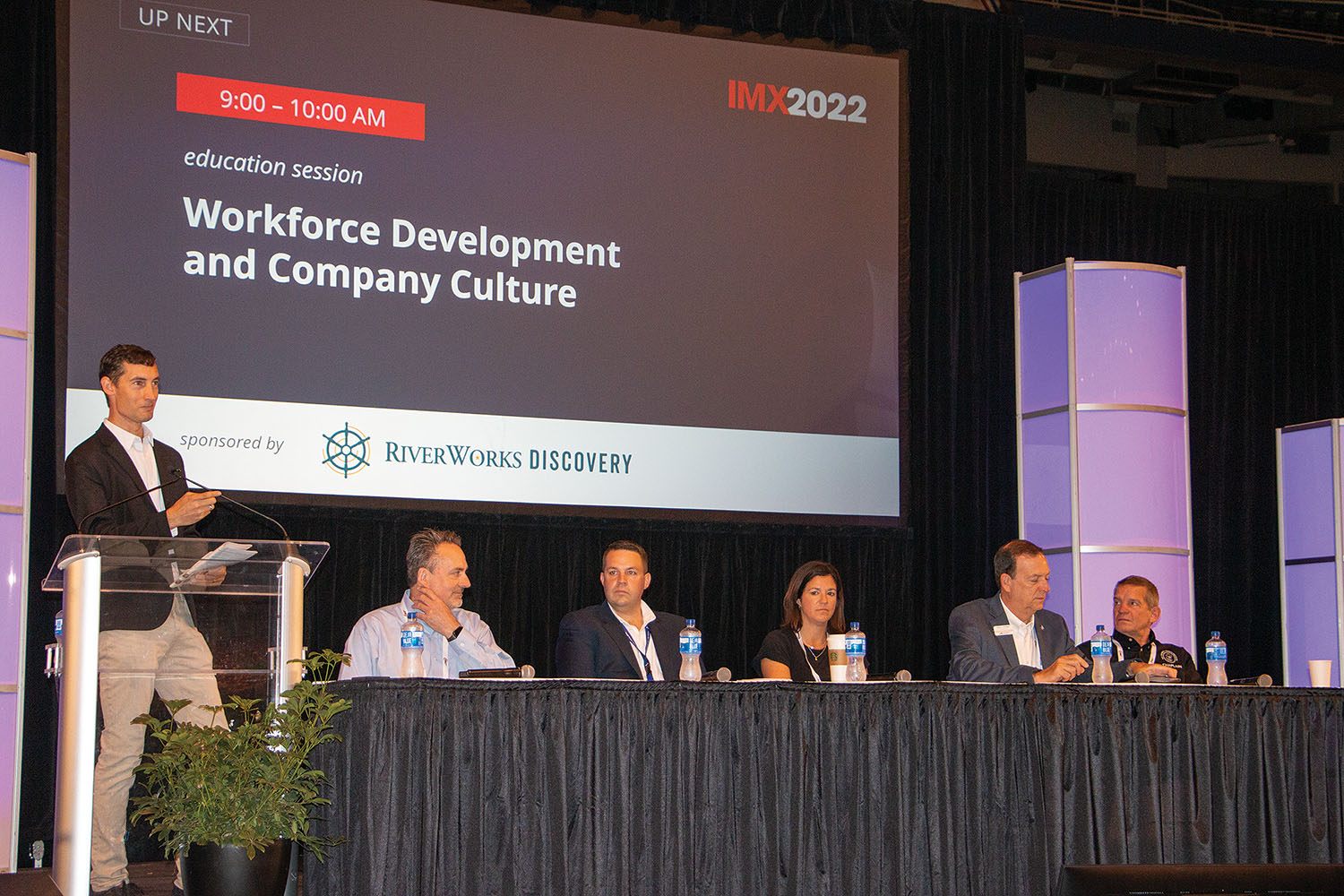With employers from many industries experiencing vacancies, panelists at the Inland Marine Expo session titled “Workforce Development and Company Culture” focused on how to address those challenges in the inland marine workforce.
Joe White, program manager for The American Equity Underwriters’ AEU LEAD program, noted that at any time there are five generations in the workforce, and that the most senior of those generations is composed of Baby Boomers, those born from 1946 to 1964, who are beginning to leave the workforce.
“The challenges we’re dealing with are going to get worse, not better,” he said.
Generation Z
As Baby Boomers leave, Generation Z is an increasing part of company payrolls.
Half that generation, born in 1997 and later, has a college degree.
“If they work for you, it’s by choice,” White said. “If they stay with you, it’s because they like the experience they are having with you.”
One of the topics most important to Generation Z is diversity, White said. While the inland marine industry has made strides, it must continue to do so, especially as 47 percent of the population is ethnic minorities, he said. Additionally, he said, Generation Z applicants may have a different appearance, but hiring managers may need to learn to be more accepting of those choices, even if it means hair colors and styles and body piercings not seen in many workplaces in previous years.
“So when we talk about diversity and inclusion, if you don’t have it, they’re not staying,” White said of Generation Z.
Patrick Parsons, counsel and senior manager of government affairs for The American Waterways Operators, noted that diversity includes making the industry more appealing to women, as not doing so effectively cuts the pool of applicants in half.
Emerging legal issues are also important for recruitment and hiring, he said. One of those is that while some states now legalize marijuana for medical or recreational use, mariners are federally regulated employees, and thus are under a zero-tolerance rule for marijuana use. Some job seekers do not understand the regulations and thus are found to be ineligible after drug testing, Parsons said.
He added that some people within the industry want to work with the Coast Guard to amend those regulations to continue to ensure safety while also recognizing that states now have widely varying laws concerning marijuana use.
Recruitment, Retention Trends
Recruiting job applicants by word of mouth is no longer enough, Parsons said.
He noted that some companies have never had a line item in their budget for recruitment, and that they should have one now.
“I would challenge you that just going out there isn’t enough,” he said.
Nor is providing a compensation and benefits package that is at or above commensurate other positions, Parsons said.
People entering the job market want a good work-life balance and a clear path toward future advancement within the company.
“It’s not enough just to tell them they can work their way up in the industry,” Parsons said.
David Shirk, chaplain for the Seamen’s Church Institute, noted that acceptance of changes in who job-seekers are and what they want from a potential employer is important in the military as well as the civilian realm.
More and more, he said, people want to be satisfied not just by getting a paycheck but also by being enriched by the job they do and the coworkers around them.
“In order to love your job, you’ve got to love the people that you work with,” he said.
Parsons agreed and said it is important for employers not to think of hiring as an endpoint and to continue to work with new employees through an onboarding process.
Education
Errin Howard, program director for RiverWorks Discovery, talked about the organization’s popular “Who Works The Rivers” program, which travels to different cities to bring members of industry together with high school students to talk about available jobs on the river.
“You’ve got to start with education,” she said of recruitment efforts. “If they’re not aware of it, they can’t come into those careers.”
Howard suggested that companies send people from diverse backgrounds to such events to represent them. As often as possible, that should include younger employees, to whom students feel they can better relate, she said.
Additionally, many students have already chosen their careers by the time they enter high school, she said. She hopes to bring in elementary schoolers for tours on towboats.
Additionally, social media campaigns can be important ways to reach younger students, she said, adding that RiverWorks Discovery gets messages on Facebook all the time with people wanting to know how they get started with a career on the river.
Examples of effective social media campaigns have included “Towboat Tuesday” posts or “You Work The Rivers Wednesday,” in which member companies can post their current job openings, she said, but added that anyone can put a post on Instagram or make a TikTok video to promote life on a towboat.
Some education efforts can begin when students are even younger, she said. For example, she talked about the Little Ports exhibit at the Louisiana Children’s Museum. Recently, she said, she learned of someone who became interested in the river industry because of frequent trips to the museum as a child. He is now a towboat captain, she said.
Kevin O’Neill, vice president of regional workforce training and economic development for West Kentucky Community & Technical College (WKCTC) in Paducah, Ky., said that education about the industry can also extend to the postsecondary level and with nontraditional groups interested in joining the industry.
WKCTC offers a fully online associate’s degree program with four tracks: marine culinary management, marine engineering, marine logistics operations and wheelhouse management. Additionally, he noted that the college has been designated as one of 27 of the Maritime Administration’s Centers of Excellence for Domestic Maritime Workforce Training and Education.
For those who are already part of the maritime workforce but looking for specific certifications, WKCTC also has its Marine Way Training Centers, with many Coast Guard-approved courses, O’Neill said.
Finally, he said, the college won a grant through the Delta Regional Authority to partner with area jails in inmate re-entry training, which includes deckhand and welding programs. Twenty-one students were scheduled to graduate from one of the programs June 4, he said. Some welders who graduated in February are already working in the marine industry. O’Neill called it an “untouched area for potential workforce.”
Caption for photo: The Waterways Journal’s Frank McCormack moderates an IMX Workforce panel including, from left: Joe White, AEU LEAD; Patrick Parsons, American Waterways Operators; Errin Howard, RiverWorks Discovery; Kevin O’Neill, West Kentucky Community & Technical College; and the Rev. David Shirk, Seamen’s Church Institute. (Photo by John Shoulberg)




